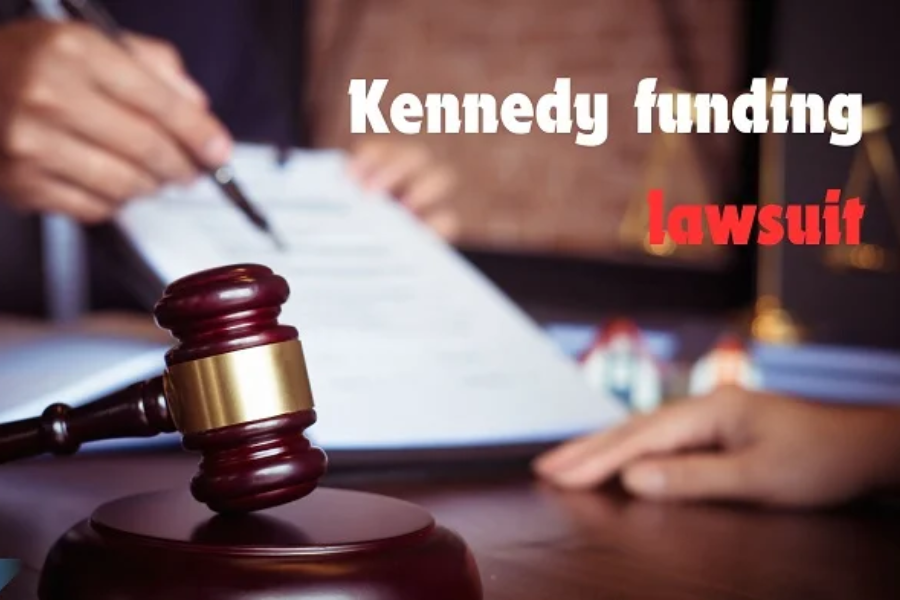The Kennedy Funding Lawsuit Explained: A Comprehensive Overview of Legal Battles in Commercial Lending
Kennedy Funding Lawsuit: A Complaint of Purported Fraud and Contract Violation
A well-known supplier of commercial real estate loans, Kennedy Funding, Inc. (KFI) is especially well-known for its bridge loans, which are short-term financial solutions that assist in bridging the gap between short-term funding requirements and long-term financing. KFI frequently works with difficult, high-stakes loan scenarios when traditional finance sources might not be accessible.
A legal dispute involving KFI, commonly referred to as the Kennedy Funding lawsuit, centers around claims brought by multiple parties, including Virgil Shelton. Shelton has accused KFI of engaging in fraudulent behavior and breaching the terms of their financial agreement. His allegations suggest that KFI failed to meet their contractual obligations and engaged in deceptive practices during the loan approval process.
Key issues brought to light in this case include claims of property value misrepresentation, withholding critical information, and poor loan management. The lawsuit underscores the critical need for transparency and adherence to ethical practices within the lending industry, especially in high-risk financial scenarios.
The Complex Financial Dispute Between Virgil Shelton and Willie Acklin: The Role of Kennedy Funding
In 1992, Virgil Shelton, the proprietor of Rest in Peace Cemetery in Hensley, Arkansas, entered into a sales agreement with Willie Acklin, a nearby undertaker. To consummate the deal without demanding an upfront payment, they agreed to a promissory note and a mortgage. Acklin committed to making payments over time, consisting of monthly installments and quarterly payments tied to the cemetery’s income.
But by the late 1990s, problems with the IRS and a botched company expansion had cost him dearly financially. Acklin requested a Kennedy Funding, Inc. bridging loan.(KFI) to restructure his obligations in an attempt to overcome his financial difficulties.
Recognised for its proficiency in bridge loans, KFI consented to lend Acklin the required amount, using the cemetery as security.However, before the loan could be finalized, KFI requested an Estoppel Certificate from Shelton. This certificate was critical, as it would outline the remaining financial obligations on the mortgage, ensuring KFI’s loan would take precedence over existing debts. Disputes arose during the negotiation of the Estoppel Certificate, ultimately leading to legal issues when Acklin defaulted on the loan.
Important Legal Issues: Contract Breach and the Function of the Estoppel Certificate
The case involving Kennedy Funding, Inc., Willie Acklin, and Virgil Shelton. (KFI) principally focusses around claimed breaches of contract. Originally, Shelton and Acklin had a promissory note and mortgage in place, under which Acklin would give Shelton ownership of Rest in Peace Cemetery in exchange for regular payments. As financial issues mounted, Acklin sought a $2.2 million bridge loan from KFI, which required an Estoppel Certificate from Shelton to confirm the remaining mortgage debt of $675,000.
By improperly handling the escrow account, which was meant to safeguard Shelton’s financial interests, KFI is accused of breaking the terms of this arrangement. Claims of breach of contract resulted from this failure to adhere to the terms specified in the Estoppel Certificate, which formed a central issue in the litigation.
The Estoppel Certificate was a legal document that attested to the financial responsibilities associated with the property, and it was crucial in the sale. Its purpose was to ensure all parties were fully aware of existing mortgage terms before KFI proceeded with the loan to Acklin. Disagreements over the interpretation and adherence to the Estoppel Certificate’s terms were at the heart of the legal proceedings.
Accusations of Fraud and Allegations of Unjust Enrichment in the Kennedy Funding Case
Virgil Shelton charged Kennedy Funding, Inc. (KFI) with fraud during the loan arrangement procedure along with allegations of contract violation.The main focus of Shelton’s fraud accusations was KFI’s purported misrepresentation of important loan terms and their omission of important facts that may have influenced his choices. KFI was specifically charged with inflating the property’s worth and deceiving Shelton about the loan agreement’s security, which eventually resulted in financial loss to him.
The fraud claims emphasized KFI’s false representations, particularly concerning the property’s value and the terms of the loan, which were said to be unfavorable to Shelton. He allegedly suffered large financial losses as a result of accepting circumstances that were not in his best interests due to this deceit. Furthermore, a major problem in the fraud allegations was on the omission of important information regarding the risks associated with the loan and the actual worth of the property.
The case also addressed allegations of unjust enrichment, alleging that KFI benefited monetarily from the lending arrangement at Shelton’s and other borrowers’ cost.
Shelton argued that KFI’s actions, including their breach of agreed-upon terms, allowed them to profit unfairly, leaving the borrowers in financial distress.
Furthermore, allegations of conspiracy emerged in the case, with claims that KFI, along with potentially other parties, had colluded in unethical or illegal activities. This purported conspiracy was seen as an effort to manipulate the loan agreement and associated transactions for KFI’s financial gain, compounding the financial losses for Shelton and the other involved parties.
Court Proceedings and Key Rulings in the Kennedy Funding Case
Discovery and Pre-Trial Developments
In the lead-up to the Kennedy Funding lawsuit trial, both sides participated in an extensive discovery process. This phase involved exchanging crucial documents such as financial records, contracts, and email correspondences. As both sides tried to strengthen their cases, depositions were obtained from important individuals, such as Virgil Shelton, Kennedy Funding, Inc. officials, and other witnesses who were crucial to the case.
A number of pre-trial motions addressing different legal facets of the case were submitted. Among these moves were ones to exclude specific evidence, move for summary judgement, and move to dismiss certain claims. In ruling on these applications, the court ensured that crucial issues would be properly investigated during the trial by rejecting certain claims and allowing other issues and evidence to proceed.This lessened the trial’s focal point.
The Trial and Verdict
During the trial, both sides provided persuasive arguments. Shelton’s legal team focused on Kennedy Funding’s fraud and breach of contract, providing proof of KFI’s claimed misrepresentation of loan conditions and its noncompliance with the Estoppel Certificate. They maintained that Shelton suffered severe financial losses as a result of these acts. In response, KFI’s defence refuted the Estoppel Certificate’s legitimacy and rejected the claims of fraud.
In the end, the jury decided in Shelton’s favour, giving him a $1.675 million damages award. This ruling took into account the jury’s finding that KFI had broken the law and committed fraud in addition to the significant financial harm the company’s activities had caused Shelton.
Appeal Outcomes and Final Ruling in the Kennedy Funding Case
Kennedy Funding, Inc. (KFI) challenged the court’s judgement after the jury’s original verdict, contesting the jury’s legal basis as well as the significant damages it had been granted. In the appeal, KFI challenged the evidence used to support the fraud accusations made during the trial, claiming that the Estoppel Certificate should not have been regarded as legally enforceable under the Arkansas Statute of Frauds.
The appellate court issued a mixed ruling. It dismissed the fraud accusations, finding insufficient evidence to sustain such allegations, but affirmed the breach of contract ruling. Because of this, Virgil Shelton was only given $675,000 in damages, rather than the original $1.675 million, which simply represented the breach of contract. This outcome demonstrated the intricate legal nuances of the case, offering a partial resolution for both Shelton and KFI.
Legal Precedents and Industry Implications of the Kennedy Funding Case
Influence on Future Litigation in the Funding Industry
The Kennedy Funding lawsuit holds the potential to create notable legal precedents within the commercial lending space. Future court cases may reference this lawsuit, particularly in matters involving the enforceability of Estoppel Certificates, breach of contract, and fraud allegations. Courts could look to the Kennedy Funding case as a benchmark when interpreting similar financial agreements, influencing how contracts are structured and upheld in future lending disputes.
Investor Confidence and Trust in Commercial Lending
The case affects investor confidence in the commercial lending sector more broadly as well. The lawsuit illustrates how investor trust in lending institutions can be undermined by allegations of fraud and contract violations. Investors may respond by putting more demands on openness and tightening up on due diligence procedures before making financial commitments. This change may result in more extensive screening procedures for both borrowers and lenders, which might have an impact on how lending businesses handle their investor relationships going ahead.
Evolution of Industry Practices and Guidelines
The ethical and legal concerns raised by the Kennedy Funding lawsuit may prompt a transformation in industry practices. In order to steer clear of the errors shown in this instance, lenders should implement stricter guidelines for communication, openness, and disclosure. Industry-wide regulations could change to better safeguard borrowers while making sure lenders follow moral principles. These modifications would attempt to prevent future legal problems and increase the reputation and integrity of the commercial lending market.
Conclusion
The Kennedy Funding lawsuit serves as a significant case within the commercial lending landscape, illustrating the complexities of contract enforcement, the importance of transparency, and the potential consequences of unethical practices. It underscores the need for both borrowers and lenders to conduct thorough due diligence and maintain clear communication to avoid legal disputes. With the court’s mixed ruling, the case not only affects the immediate parties involved but also sets a precedent that may influence future litigation, investor confidence, and industry standards. The lessons learned from this case highlight the critical role of ethical conduct and comprehensive understanding of financial agreements in ensuring the integrity of the lending process.
Keep an eye for more news & updates on Ny American!






